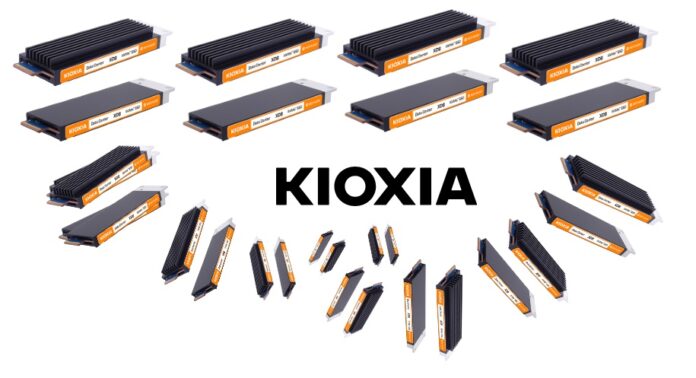Kioxia says it has accelerated RocksDB performance 1.8x and increased an SSD’s endurance 300 percent by using Flexible Data Placement (FDP) when writing data to the SSD. It has also launched a new XD8 PCIe gen 5 SSD for cloud providers and hyperscalers.
FDP allows the placement of different data types in separate NAND blocks within an SSD. In a conventional SSD all data written to the drive at a similar time will be stored in the same NAND blocks. When any of this data is either invalidated by a new write or unmapped, then the flash translation layer (FTL) needs to do garbage collection (GC) in order to recover the physical space. Different kinds of data can be separated during host writes in an FDP SSD, allowing for whole NAND blocks to be invalidated or unmapped at once by the host. FDP optimisation can enhance performance and extend the lifespan of the SSD. It is backwards compatible with current applications whereas the alternative zoned name space (ZNS) technology is not.The NVM Express base specification (TP4161) defines the FDP feature
RocksDB is a storage engine – low-level code used to write data to and read data from storage drives. Facebook created key:value based RocksDB for its internal use and contributed it to the wider community. RocksDB is a fork of Google’s LevelDB, and has become a near standard for building modern data management software services. Kioxia says it “excels in high-performance searches through vast amounts of data and managing history data, and is widely used in generative AI and cloud applications.”
Kioxia has developed FDP plug-in code for applications writing data to an XD Series SSD. This provides an around 1.8 times performance boost for RocksDB and a threefold extension of the SSDs’s endurance “compared to a traditional system utilising conventional SSDs and file system.”
The company has also announced a new XD8 SSD supporting the PCIe gen 5 interface, NVMe 2.0, and the OCP Datacentre NVMe SSD v2.5 spec. It comes in the E1.S form factor (9.5mm, 15mm, and 25mm heat sink options) with 1.92, 3.84, and 7.68 TB capacity points, and follows on from the XD7P. The sequential read performance is a claimed 12.5 GBps, which is said to be “a 73 percent improvement over the previous [XD7P) generation” which has an up 7.2GBps sequential read speed.

The sequential write speed is 5.8 GBps and the random read and write IOPS numbers are up to 2.3 million and 250,000 IOPS respectively.

Paul Rowan, VP & CMO of the Memory and SSD Business Units at Kioxia Europe GmbH, stated: “The Kioxia XD8 Series is designed to provide outstanding performance and thermal management, meeting the requirements of contemporary cloud and hyperscale environments.”
Kioxia has not said which BiCS 3D NAND generation tech is used in the XD8 but we think it is either BiCS6 or 8, meaning 162 or 218 layers, and have asked the company to clarify this.
The XD8 SSD is now being sample shipped to potential customers. Kioxia will demo its RocksDB accelerated FDP plug-in SSD at its booth (A7) during the 2024 OCP Global Summit, Oct 15 to 17. It plans to release the RocksDB FDP compatibility plug-in as an open-source contribution.








